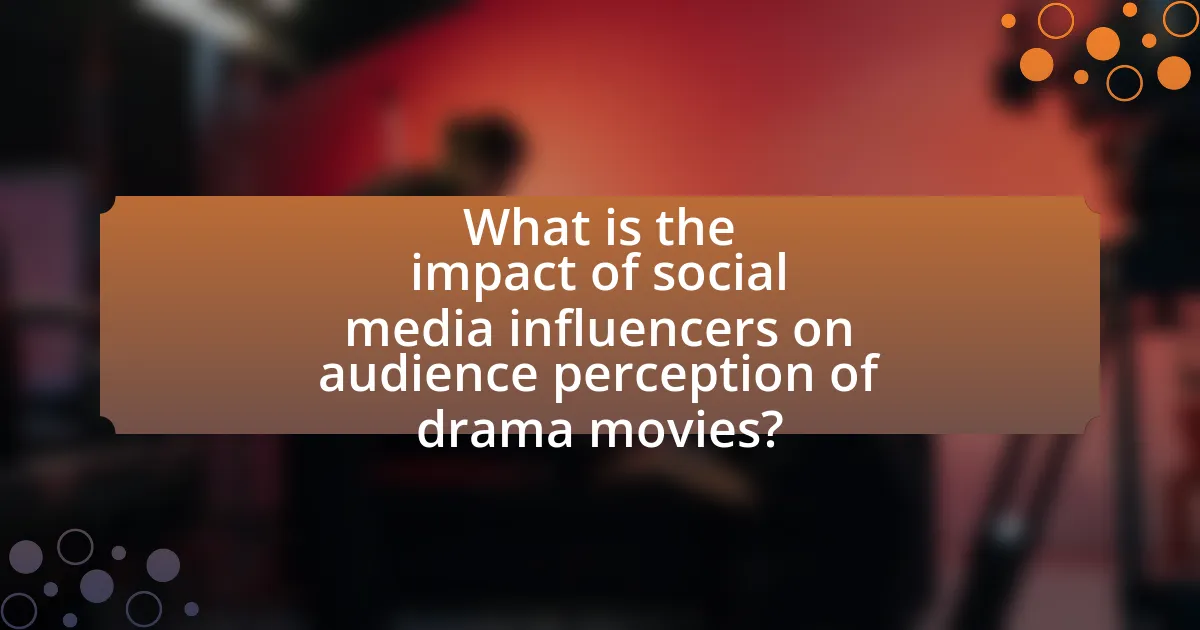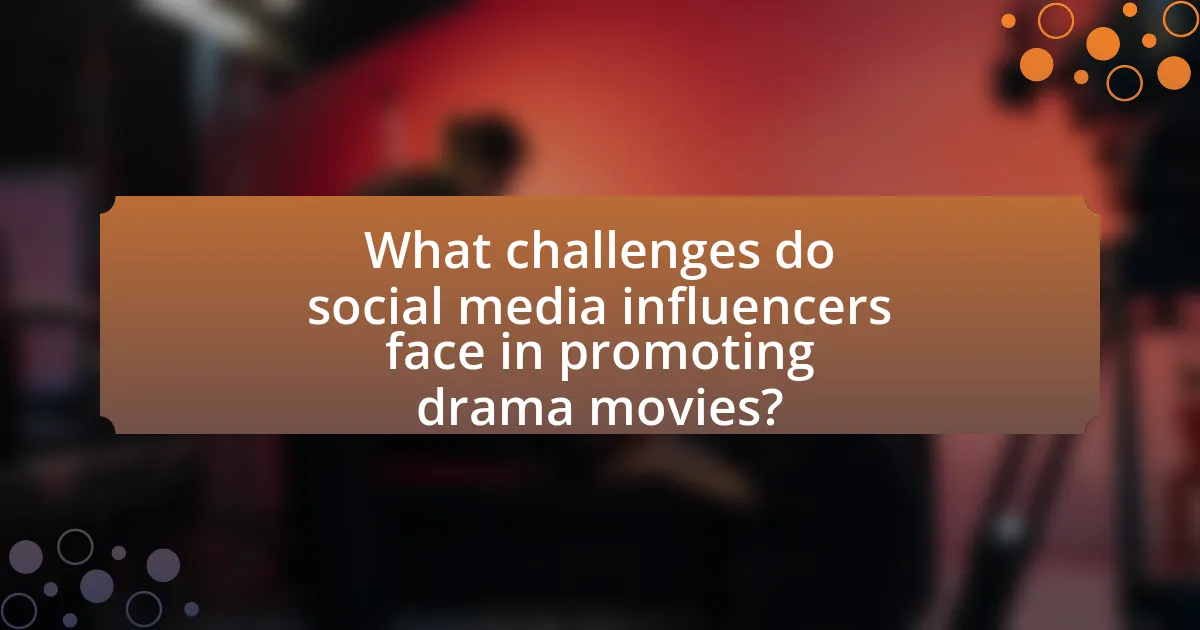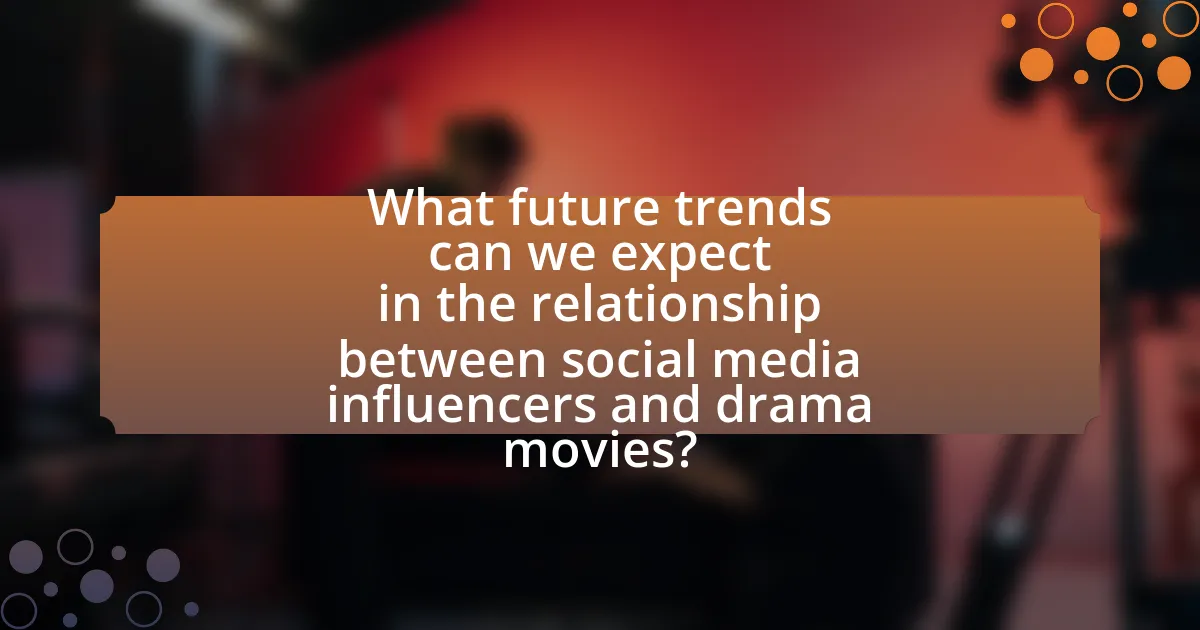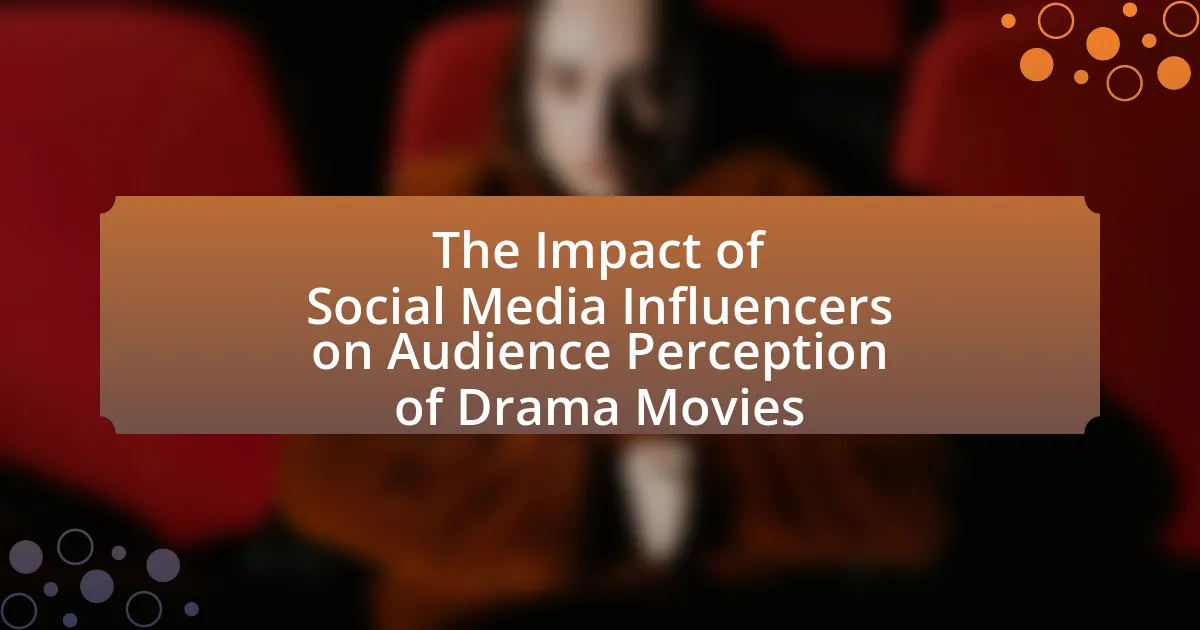The article examines the significant impact of social media influencers on audience perception of drama movies. It highlights how influencers leverage their reach and credibility to enhance film visibility, shape audience opinions, and drive engagement through personal insights and endorsements. Key findings include the effectiveness of influencer marketing in increasing consumer interest, particularly among younger demographics, and the role of authenticity and emotional connection in fostering trust. Additionally, the article discusses the challenges influencers face in maintaining credibility and the ethical considerations surrounding their promotional practices. Emerging trends and technologies are also explored, indicating a shift towards more personalized and interactive marketing strategies in the film industry.

What is the impact of social media influencers on audience perception of drama movies?
Social media influencers significantly shape audience perception of drama movies by leveraging their reach and credibility to create buzz and generate interest. Their endorsements can enhance the visibility of specific films, leading to increased audience engagement and viewership. For instance, a study published in the Journal of Marketing Research found that influencer marketing can lead to a 37% increase in consumer interest in a product, including movies. This influence is particularly pronounced among younger demographics who often rely on social media for recommendations. Additionally, influencers often provide personal insights and reviews that can frame the narrative around a film, impacting how audiences interpret its themes and messages.
How do social media influencers shape audience opinions about drama movies?
Social media influencers shape audience opinions about drama movies by leveraging their platforms to create engaging content that highlights specific films, often through reviews, trailers, and personal anecdotes. Their large followings and perceived authenticity allow them to sway public perception, as audiences tend to trust their recommendations over traditional advertising. For instance, a study by the Pew Research Center found that 72% of teenagers trust influencers more than traditional celebrities, indicating a significant impact on their movie choices. Additionally, influencers often engage with their followers through discussions and polls, further reinforcing their influence on audience opinions regarding drama films.
What role do influencers play in the marketing of drama films?
Influencers play a crucial role in the marketing of drama films by leveraging their social media platforms to create buzz and engage audiences. They promote films through reviews, behind-the-scenes content, and personal endorsements, which can significantly enhance visibility and interest. For instance, a study by the University of Southern California found that influencer marketing can increase audience engagement by up to 60%, demonstrating the effectiveness of influencers in reaching potential viewers. Their ability to connect with niche audiences allows drama films to target specific demographics, ultimately driving ticket sales and viewership.
How do influencers’ reviews affect audience expectations?
Influencers’ reviews significantly shape audience expectations by establishing perceived credibility and desirability for drama movies. When influencers share their opinions, they often highlight specific elements such as storytelling, character development, and emotional impact, which can lead audiences to anticipate similar experiences. Research indicates that 49% of consumers rely on influencer recommendations, demonstrating their influence on audience perceptions and expectations. This reliance is further supported by a study from the Journal of Marketing Research, which found that endorsements from trusted influencers can enhance consumer trust and increase the likelihood of viewing a film.
Why are social media influencers significant in the film industry?
Social media influencers are significant in the film industry because they shape audience perceptions and drive engagement through their extensive reach and credibility. Their ability to connect with large, targeted audiences allows filmmakers to promote films effectively, often resulting in increased viewership and box office success. For instance, a study by the University of Southern California found that films promoted by influencers saw a 20% increase in ticket sales compared to those without influencer marketing. This demonstrates the tangible impact influencers have on audience behavior and film performance.
What demographic trends are associated with influencer followings?
Demographic trends associated with influencer followings indicate that younger audiences, particularly those aged 18 to 34, are the most engaged with social media influencers. This age group represents a significant portion of influencer followers, as studies show that 70% of teenagers trust influencers more than traditional celebrities. Additionally, gender plays a role, with female audiences often following lifestyle and beauty influencers, while male audiences tend to engage more with gaming and tech influencers. Geographic factors also influence followings, as urban populations are more likely to follow influencers compared to rural populations, reflecting access to social media platforms.
How do influencers create a sense of community around drama movies?
Influencers create a sense of community around drama movies by fostering engagement through discussions, live streams, and social media interactions. They utilize platforms like Instagram, TikTok, and YouTube to share personal insights, reviews, and behind-the-scenes content, which encourages followers to participate in conversations about the films. For instance, influencers often host watch parties or Q&A sessions that invite their audience to share their thoughts and feelings about specific drama movies, thereby enhancing a collective viewing experience. This interactive approach not only builds a loyal fan base but also cultivates a shared emotional connection among viewers, as evidenced by the increased engagement metrics seen in posts related to popular drama films.
What are the psychological effects of influencer endorsements on viewers?
Influencer endorsements significantly impact viewers’ psychological states by enhancing brand trust and shaping consumer behavior. Research indicates that endorsements from influencers can lead to increased feelings of relatability and social connection, which in turn fosters a sense of trust in the promoted products or services. A study published in the Journal of Advertising Research found that 61% of consumers trust influencer recommendations, highlighting the effectiveness of these endorsements in swaying viewer opinions. Additionally, the mere exposure effect suggests that repeated exposure to influencer content can increase viewers’ preference for the endorsed products, further solidifying their purchasing intentions.
How do emotional connections with influencers influence movie choices?
Emotional connections with influencers significantly influence movie choices by enhancing audience engagement and trust in the recommendations provided by these influencers. When audiences feel a personal bond with an influencer, they are more likely to value their opinions and consider their movie suggestions as credible. Research indicates that 70% of consumers are influenced by the recommendations of their favorite influencers, leading to increased likelihood of viewing the films they promote. This connection often stems from shared values, relatable content, and consistent interaction, which fosters a sense of community and loyalty among followers. Consequently, the emotional ties formed can directly translate into higher ticket sales and viewership for the movies endorsed by these influencers.
What cognitive biases are at play when audiences consume influencer content?
When audiences consume influencer content, several cognitive biases are at play, including the bandwagon effect, confirmation bias, and the halo effect. The bandwagon effect leads individuals to adopt beliefs or behaviors because they perceive that others are doing so, which is evident in the popularity of influencers who promote certain drama movies. Confirmation bias causes audiences to favor information that aligns with their pre-existing beliefs, often leading them to trust influencers who share similar tastes in film. The halo effect occurs when audiences attribute positive qualities to influencers based on their likability or attractiveness, which can enhance the perceived value of the content they promote. These biases significantly shape audience perceptions and decisions regarding drama movies influenced by social media personalities.
How do social media platforms facilitate influencer impact on drama movies?
Social media platforms facilitate influencer impact on drama movies by providing a direct channel for influencers to engage with their audiences, thereby amplifying movie promotions and shaping viewer perceptions. Influencers utilize platforms like Instagram, Twitter, and TikTok to share reviews, behind-the-scenes content, and personal endorsements, which can significantly sway audience interest and box office performance. For instance, a study by the University of Southern California found that 70% of young adults are influenced by social media recommendations when deciding which movies to watch. This demonstrates the effectiveness of influencers in leveraging social media to create buzz and drive viewership for drama films.
What features of platforms enhance influencer reach and engagement?
Platforms enhance influencer reach and engagement through features such as algorithm-driven content distribution, interactive tools, and analytics. Algorithm-driven content distribution ensures that posts are shown to users who are most likely to engage, increasing visibility. Interactive tools, like polls and Q&A sessions, foster direct communication between influencers and their audience, enhancing engagement. Additionally, analytics provide influencers with insights into audience behavior, allowing them to tailor content effectively. For instance, Instagram’s algorithm prioritizes content based on user interactions, which has been shown to increase engagement rates significantly, with studies indicating that posts shown to targeted audiences can achieve up to 80% higher engagement.
How does content format (videos, posts, stories) affect audience perception?
Content format significantly influences audience perception by shaping engagement levels and emotional responses. Videos tend to evoke stronger emotional reactions due to their dynamic nature, allowing for visual storytelling that can enhance relatability and connection. For instance, a study by the University of Southern California found that video content can increase viewer retention by up to 95% compared to text-based posts. In contrast, static posts may provide information but often lack the emotional depth that videos offer, leading to a more superficial engagement. Stories, which are ephemeral and often more personal, can create a sense of urgency and intimacy, prompting audiences to feel more connected to the influencer and the content. This multifaceted approach to content format ultimately affects how audiences perceive and relate to drama movies, as influencers leverage these formats to craft compelling narratives that resonate with their followers.

What challenges do social media influencers face in promoting drama movies?
Social media influencers face several challenges in promoting drama movies, primarily due to audience engagement and content authenticity. Influencers often struggle to capture the nuanced emotional depth of drama films in a format that resonates with their followers, who may prefer lighter or more entertaining content. Additionally, the competitive landscape of social media means that influencers must differentiate their promotional content from a plethora of similar posts, which can dilute the impact of their messaging.
Moreover, maintaining authenticity is crucial; influencers risk losing credibility if their promotions appear overly scripted or insincere, especially in a genre that relies heavily on emotional connection. According to a study by the Pew Research Center, 70% of social media users value authenticity in influencer content, indicating that any perceived lack of genuine enthusiasm for a drama movie can lead to disengagement. Thus, the challenges of emotional representation, competition, and authenticity significantly hinder social media influencers in effectively promoting drama films.
How do authenticity and credibility affect influencer effectiveness?
Authenticity and credibility significantly enhance influencer effectiveness by fostering trust and engagement among audiences. When influencers present themselves authentically, they resonate more deeply with their followers, leading to higher levels of relatability and emotional connection. Research indicates that 92% of consumers trust recommendations from individuals over brands, highlighting the importance of perceived authenticity in influencer marketing. Furthermore, credible influencers, who are perceived as knowledgeable and honest, can drive higher conversion rates; studies show that 70% of millennials are influenced by the recommendations of their peers, which underscores the role of credibility in shaping audience perceptions and behaviors. Thus, authenticity and credibility are critical factors that directly impact the effectiveness of influencers in promoting drama movies and other content.
What are the risks of influencer marketing for drama films?
The risks of influencer marketing for drama films include potential misalignment between the influencer’s brand and the film’s themes, which can lead to audience skepticism. If an influencer promotes a drama film that does not resonate with their established persona, it may result in negative perceptions and reduced credibility for both the influencer and the film. Additionally, influencer marketing can create unrealistic expectations; if the influencer’s portrayal of the film is overly positive, audiences may feel disappointed upon viewing, leading to poor word-of-mouth and reviews. Furthermore, there is a risk of backlash if the influencer becomes involved in controversy, which can adversely affect the film’s reception. According to a study by the Digital Marketing Institute, 60% of consumers have unfollowed an influencer due to a mismatch between their values and the influencer’s endorsements, highlighting the importance of alignment in influencer partnerships.
How can influencers maintain trust with their audience while promoting films?
Influencers can maintain trust with their audience while promoting films by ensuring authenticity in their endorsements. Authenticity is crucial because audiences are more likely to trust influencers who genuinely appreciate the content they promote. For instance, influencers should only endorse films that align with their personal brand and values, which fosters a sense of credibility. Research indicates that 92% of consumers trust recommendations from individuals over brands, highlighting the importance of genuine connections. Additionally, influencers can engage their audience by sharing personal experiences related to the film, thus creating a narrative that resonates with their followers. This approach not only enhances trust but also encourages audience engagement and loyalty.
What ethical considerations arise in influencer marketing for drama movies?
Ethical considerations in influencer marketing for drama movies include transparency, authenticity, and the potential for manipulation. Influencers must disclose paid partnerships to maintain transparency, as failing to do so can mislead audiences about the nature of their endorsements. Authenticity is crucial; influencers who promote content that does not align with their personal brand risk losing credibility, which can affect audience trust in both the influencer and the movie. Additionally, the potential for manipulation arises when influencers create unrealistic expectations about the film’s quality or themes, which can distort audience perceptions and lead to disappointment. These ethical issues highlight the responsibility of influencers to act with integrity in their marketing practices.
How do disclosure practices impact audience trust in influencer recommendations?
Disclosure practices significantly enhance audience trust in influencer recommendations. When influencers transparently disclose their partnerships or sponsorships, it fosters authenticity and credibility, leading audiences to perceive their recommendations as more trustworthy. Research by the Federal Trade Commission (FTC) indicates that clear disclosures can improve consumer understanding and trust, as audiences are more likely to believe that influencers are being honest about their endorsements. This transparency reduces skepticism and aligns with audience expectations for ethical marketing, ultimately strengthening the influencer’s relationship with their followers.
What are the implications of sponsored content on audience perception?
Sponsored content significantly influences audience perception by blurring the lines between advertising and organic content. This blending can lead to increased trust in the content, as audiences often perceive sponsored posts as endorsements from relatable figures, such as social media influencers. Research indicates that 61% of consumers trust influencer recommendations more than brand advertisements, highlighting the effectiveness of sponsored content in shaping positive audience attitudes. However, if audiences recognize the content as sponsored, it may lead to skepticism and diminish credibility, as 70% of consumers feel misled by influencers who do not disclose sponsorships. Thus, the implications of sponsored content on audience perception are complex, affecting both trust and skepticism depending on transparency and audience awareness.

What future trends can we expect in the relationship between social media influencers and drama movies?
Future trends indicate that social media influencers will increasingly shape the marketing and narrative strategies of drama movies. As influencers gain substantial followings, studios will likely collaborate with them to create authentic promotional content that resonates with target audiences, enhancing engagement and viewership. For instance, a study by the Pew Research Center shows that 72% of teenagers engage with influencers, suggesting that their endorsements can significantly impact movie attendance. Additionally, influencers may participate in storytelling by integrating their personal experiences into the film’s themes, making the content more relatable and appealing to their followers. This trend reflects a shift towards a more interactive and personalized approach in film marketing, leveraging the influencers’ ability to connect with audiences on a deeper level.
How might emerging technologies change influencer marketing strategies?
Emerging technologies will significantly change influencer marketing strategies by enabling more personalized and data-driven approaches. For instance, advancements in artificial intelligence and machine learning allow brands to analyze consumer behavior and preferences more accurately, leading to targeted campaigns that resonate with specific audience segments. According to a report by eMarketer, 72% of marketers believe that AI will enhance their influencer marketing efforts by improving audience targeting and engagement. Additionally, augmented reality (AR) and virtual reality (VR) technologies provide immersive experiences that influencers can leverage to create more engaging content, thereby increasing audience interaction and brand loyalty. These technologies not only enhance the effectiveness of influencer marketing but also transform how brands and influencers collaborate, making partnerships more strategic and impactful.
What role will virtual reality and augmented reality play in influencer promotions?
Virtual reality (VR) and augmented reality (AR) will significantly enhance influencer promotions by creating immersive and interactive experiences that engage audiences more deeply. These technologies allow influencers to showcase products or experiences in a virtual environment, enabling potential customers to visualize and interact with offerings in a way that traditional media cannot achieve. For instance, a study by PwC found that VR can increase consumer engagement by up to 27%, demonstrating its effectiveness in capturing attention and driving interest. By integrating VR and AR into their promotional strategies, influencers can provide unique storytelling opportunities that resonate with audiences, ultimately influencing their perceptions and purchasing decisions regarding drama movies and related products.
How can data analytics enhance influencer effectiveness in film marketing?
Data analytics can enhance influencer effectiveness in film marketing by providing insights into audience preferences and engagement patterns. By analyzing data from social media platforms, marketers can identify which influencers resonate most with target demographics, allowing for more strategic partnerships. For instance, a study by Nielsen found that campaigns utilizing influencer marketing can yield an ROI of up to 11 times the initial investment when aligned with audience interests. Additionally, data analytics enables real-time tracking of campaign performance, allowing for adjustments that optimize reach and impact. This targeted approach ensures that film marketing efforts are more efficient and effective, ultimately leading to increased audience engagement and ticket sales.
What best practices should influencers follow when promoting drama movies?
Influencers should prioritize authenticity and emotional connection when promoting drama movies. Authenticity builds trust with the audience, as viewers are more likely to engage with content that feels genuine. For instance, influencers can share personal stories or experiences related to the film’s themes, which enhances relatability and emotional resonance. Additionally, utilizing high-quality visuals and engaging storytelling techniques can effectively capture the essence of the drama, making the promotion more compelling. Research indicates that emotional engagement significantly influences audience perception and decision-making, as seen in a study by the Journal of Marketing Research, which found that emotionally charged content leads to higher viewer retention and interest.
How can influencers create authentic content that resonates with their audience?
Influencers can create authentic content that resonates with their audience by sharing personal stories and experiences related to the drama movies they promote. This approach fosters a genuine connection, as audiences are more likely to engage with content that reflects real emotions and relatable situations. Research indicates that 79% of consumers prefer to buy from brands that share their values, highlighting the importance of authenticity in influencer marketing. By aligning their content with the interests and values of their audience, influencers can enhance relatability and trust, ultimately leading to a stronger impact on audience perception of drama movies.
What strategies can influencers use to engage their followers effectively?
Influencers can engage their followers effectively by utilizing interactive content, such as polls, Q&A sessions, and live streams. These strategies foster direct communication and create a sense of community among followers. For instance, a study by the Pew Research Center found that 72% of teens engage with influencers through comments and direct messages, indicating that interactive formats enhance follower engagement. Additionally, influencers can leverage storytelling techniques to share personal experiences related to drama movies, which resonates emotionally with their audience and encourages deeper connections.
